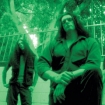After playing a handful of surprise reunion shows back in February, infamous avant-metal misfits Mr. Bungle have been unveiling their first studio recordings since 1999's California. But rather than a new album, vocalist Mike Patton, guitarist Trey Spruance and bassist Trevor Dunn decided to re-record their 1986 high school demo, The Raging Wrath of the Easter Bunny, with a little help from Anthrax guitarist Scott Ian and former Slayer drummer Dave Lombardo. Which makes sense, given that Slayer and Anthrax were two major Bungle inspirations back in the day. Ahead of the album's October 30th release and the group's Halloween livestream concert — not to mention, Patton's appearance on one of the collectible covers of Revolver's Fall 2020 Issue — we caught up with Dunn, who gave us some insight into the new release and regaled us with tales of metal, meth and music teachers from the band's earliest days in Eureka, California.
OTHER THAN THE FACT THAT IT'S A WAY BETTER RECORDING, WHAT DO YOU LIKE BETTER ABOUT THE NEW VERSION OF RAGING WRATH?
TREVOR DUNN Oh, man — everything. I didn't really think about this going into it, but it retains the energy and teenage angst that, at this point, we all have to work a little harder to conjure up. [Laughs] But back then it was utterly natural. So that's something that I'm grateful for. It's also more tightly played, and there were a lot of details that nobody would notice about the demo that kind of bothered us over the years—mistakes and things like that. We were finally able to correct those, and add some new creative elements as well.
And Patton's voice is clearly stronger. That demo in '85 was his first recording — it was actually the first time any of us had played on a recording — but with his voice being on top, it's a noticeable element. And we've obviously developed some chops over the years, I think.
YOU ALSO RESURRECTED SOME SONGS FROM THAT ERA THAT NO ONE HAD HEARD BEFORE—"METHEMATICS," "ERACIST" AND "GLUTTON FOR PUNISHMENT"…
Yeah, we'd actually never played them before. Two of them were songs that I wrote that were essentially finished — except one didn't have lyrics, so I had Patton write lyrics for that one. They were on cassette tape, because that's how we used to make demos, so it was just me playing the song. And then the song "Eracist" wasn't so much a song as a couple of riffs that Patton wrote back then, but Trey remembered those riffs somehow and then Patton wrote a new bridge to go with them. But yeah, those songs had never been played live before we did that L.A. show back in February.
WHEN YOU STARTED BUNGLE IN HIGH SCHOOL, YOU GUYS WERE INFLUENCED BY A COUPLE OF TEACHERS YOU HAD—AND NOW YOU'VE REFERENCED THEM IN THE NEW LYRICS TO THE UNRELEASED SONGS, RIGHT?
Yeah, but it's pretty buried. The song "Methematics" had an original title that was "Mathematics," but I never had any lyrics or vocal ideas for it. When we revisited the song and I was thinking about what to do, I talked to Trey and Mike and suggested that maybe it should be a tribute to Humboldt County, where we're from. Unfortunately, there's a lot of meth up there now. [Laughs] Trey and I still go up there to visit family, and we see the degradation happening before our eyes.
Through that conversation, we came up with the title "Methematics" and Patton wrote the lyrics. There's a lot of inside references to events that happened up there when we were kids that nobody would be able to decipher, but there's one line where he references one of our English teachers who turned us onto Marquis de Sade and [Jerzy] Kosinski's The Painted Bird, which is a brutal book.
YEAH, IT'S HORRIFYING.
[Laughs] Yeah. I think the line is "Painted Bird, Marquis de Sade, teachers ain't no fucking fraud." Patton and I both had that teacher — I'm not sure if Trey did or not. Then there was a music teacher who was inspirational for all of us. He'd let us hang out in the music room during lunch hour and jam and improvise and stuff. He was aware of Mr. Bungle, and at some point a year or two into our existence, we had a horn player who couldn't make a gig so this music teacher — Dan Horton is his name — sat in and did the whole gig with us. He wore a mask and everything. He's still up in Humboldt County and we often hang out when I'm up there. But having that kind of encouragement was priceless, I think.
HOW MUCH DO YOU THINK GROWING UP IN EUREKA—AND WHAT I PRESUME IS THE BOREDOM FACTOR THAT GOES ALONG WITH THAT—PLAYS INTO THE ORIGIN STORY OF MR. BUNGLE?
Pretty heavily, I think. It was by chance that Trey and Mike and I were basically the same age — Trey is a little bit younger than me and Mike — but the fact that we found each other was bound to happen because we were curious about music, mostly, but also literature and films and stuff. In a small town like that, most of our peers were getting trashed on the weekends and not really taking school seriously, but we were getting the most out of it. Our teachers turned us onto Charlie Parker and, like I said, Kosinski and stuff that we wouldn't have heard of otherwise in a small town like that. It was fortunate that we were curious and open-minded enough to follow through with that stuff, but had we been five or 10 years different in age, we probably wouldn't have met.
PRIOR TO FORMING BUNGLE, YOU AND PATTON WERE IN A THRASH BAND TOGETHER WHILE TREY AND ORIGINAL BUNGLE DRUMMER JED WATTS WERE IN ANOTHER BAND TOGETHER. TREY TOLD ME THAT YOU AND PATTON WERE KICKED OUT OF THAT THRASH BAND, BUT HE DIDN'T KNOW WHY. WHAT WAS THE STORY THERE?
[Laughs] It's funny because in the new release, I wrote some liner notes for the "Yearbook Edition," and I talk a little bit about that. I'd been playing in bands for a while at that point and I was in one with Patton in the early 80s before we both got asked to join this speed metal band that was a cover band, really. It was a bunch of guys we went to high school with who played Metallica, Slayer and Anthrax songs, basically. I was actually playing rhythm guitar in that band for some reason — I can't remember why — but we only did a handful of gigs.
Patton and I were starting to branch out into listening to punk, but the other guys were strict metalheads, and back in the early 80s those lines didn't really cross yet in Humboldt County. But to us it was like, "It's fast and heavy. What's not to like?" [Laughs] So I don't know if it was an official "kicking out" but they just stopped calling us to come to rehearsal. But that was right around the time we met Trey and Jed, and that was the beginning of Mr. Bungle.
ALONG WITH EVERY OTHER BAND ON THE PLANET, YOU'RE IN A HOLDING PATTERN WHERE YOU CAN'T TOUR DUE TO THE PANDEMIC. DOES THAT ENFORCED DOWNTIME INCREASE THE LIKELIHOOD OF AN ALBUM OF ALL-NEW BUNGLE MATERIAL?
I'd say no. That's not something we've really touched upon yet. We decided to do this re-recording, but doing new material is a whole other can of worms—not even worms, really… it's like a can of oceanography. [Laughs]








